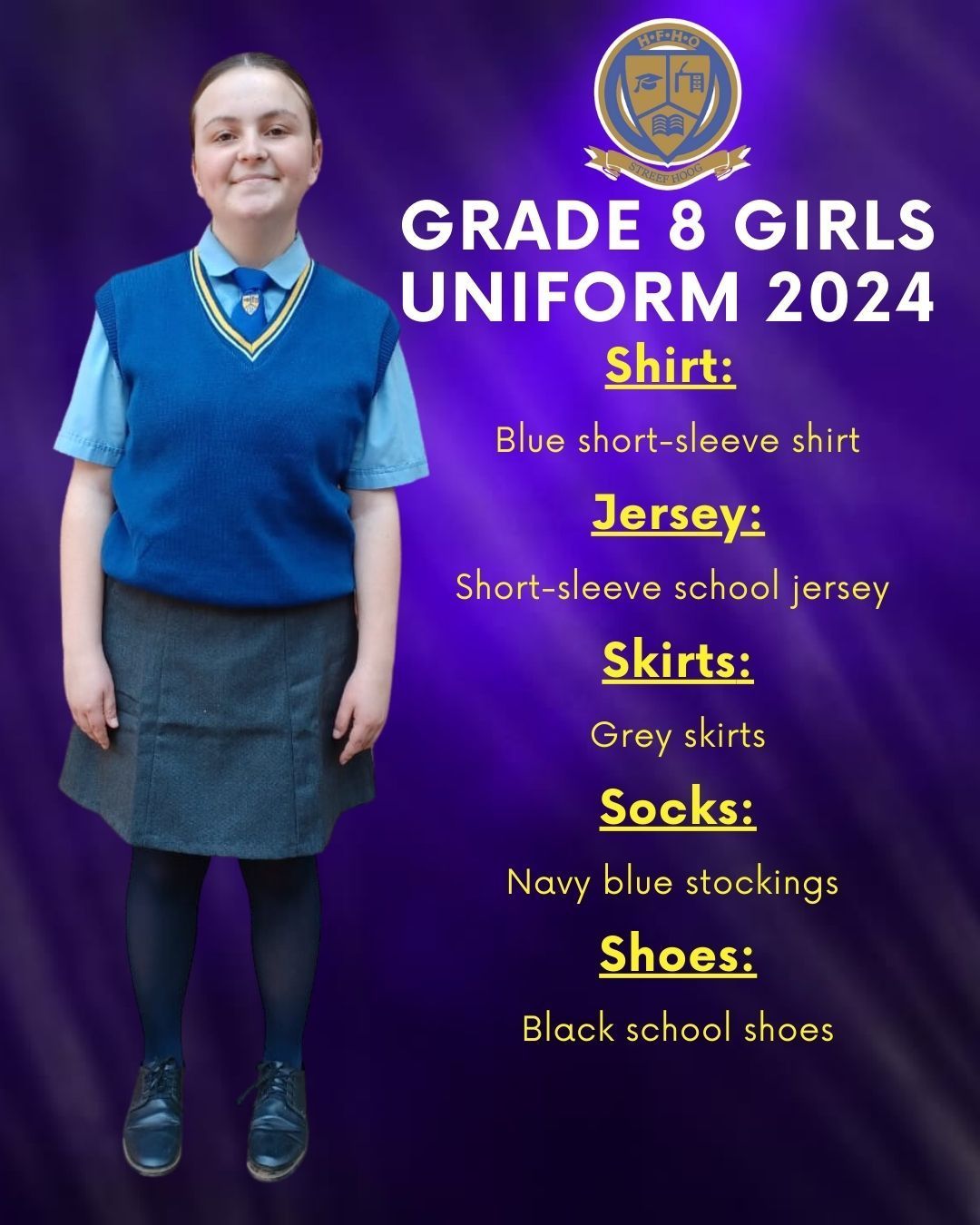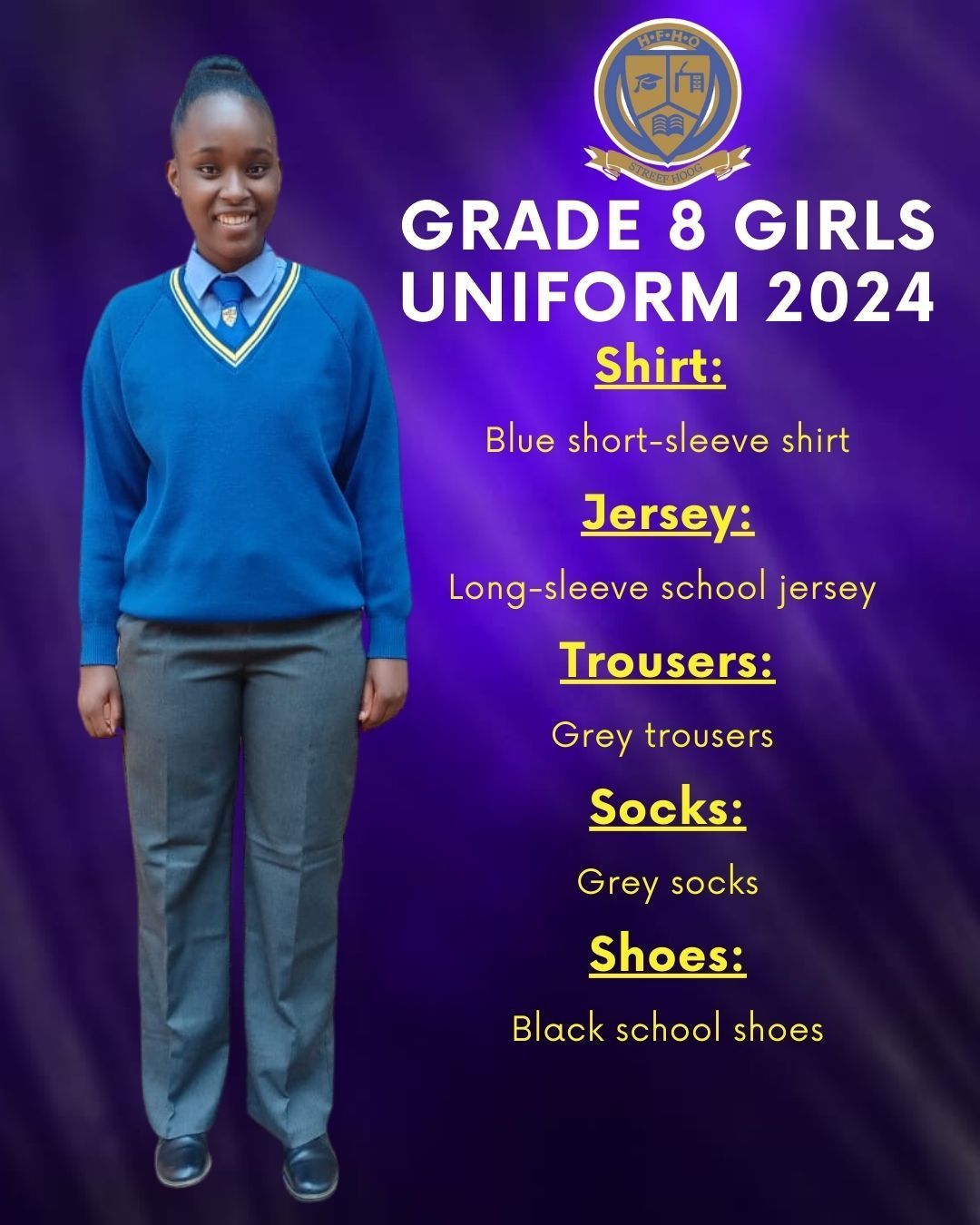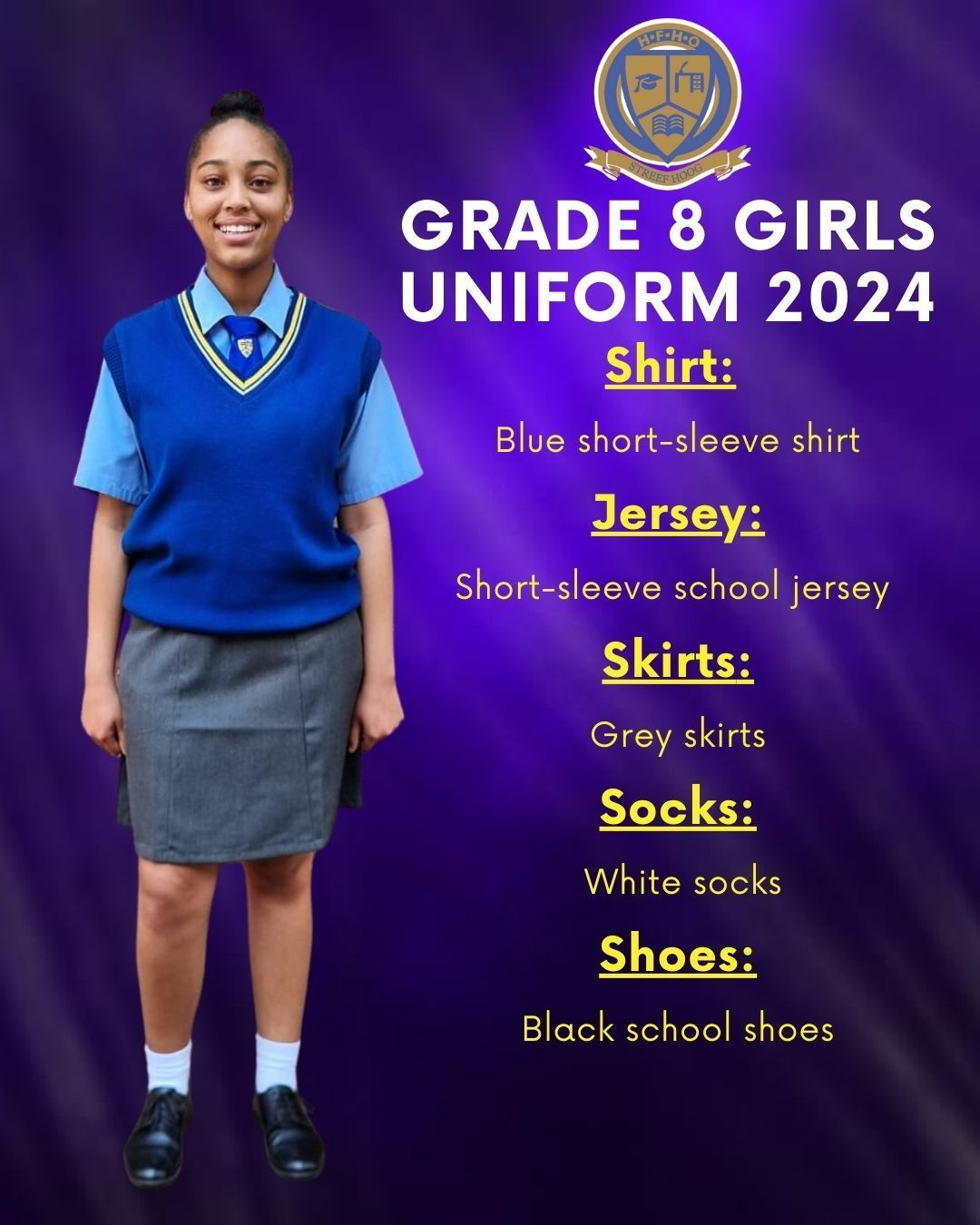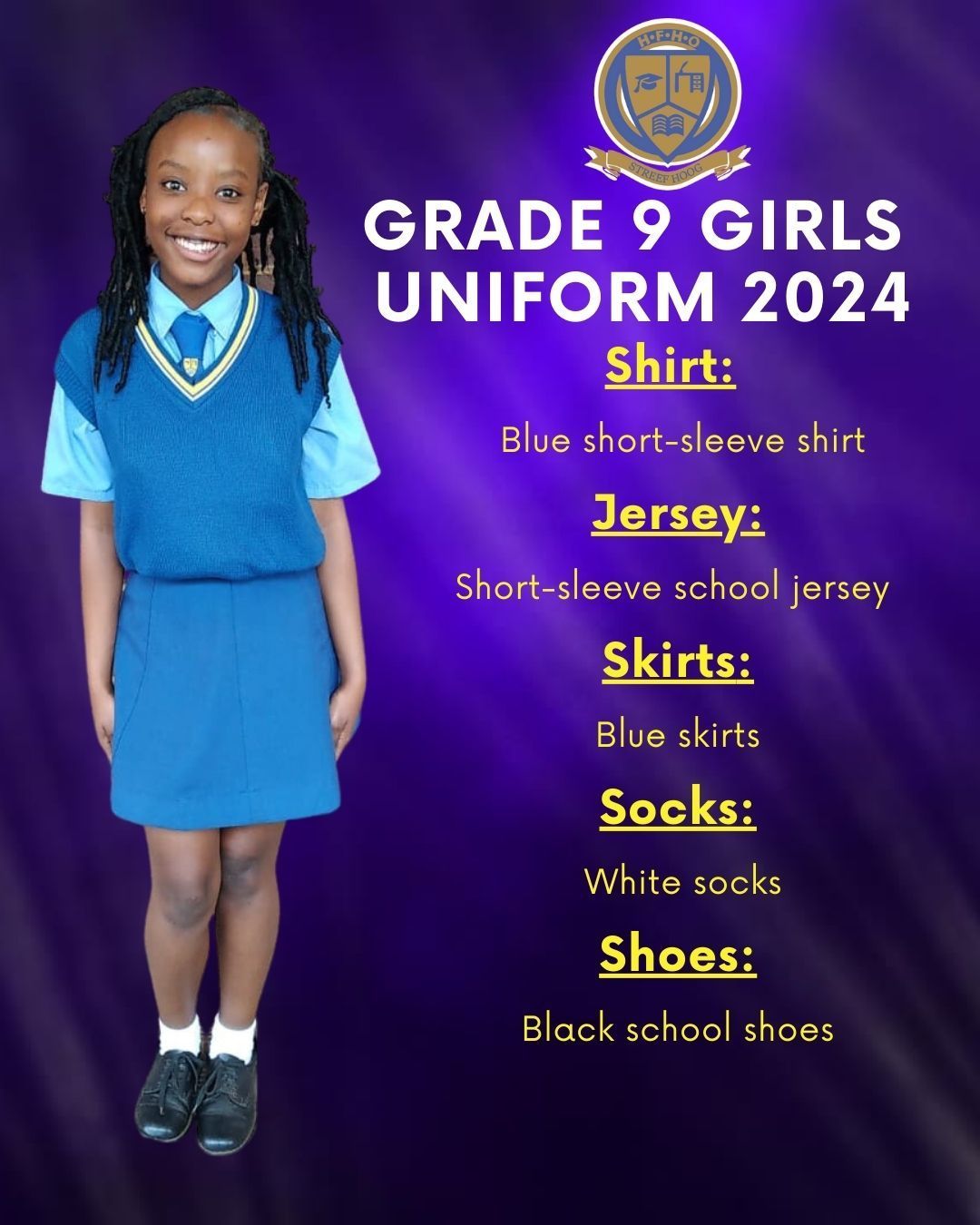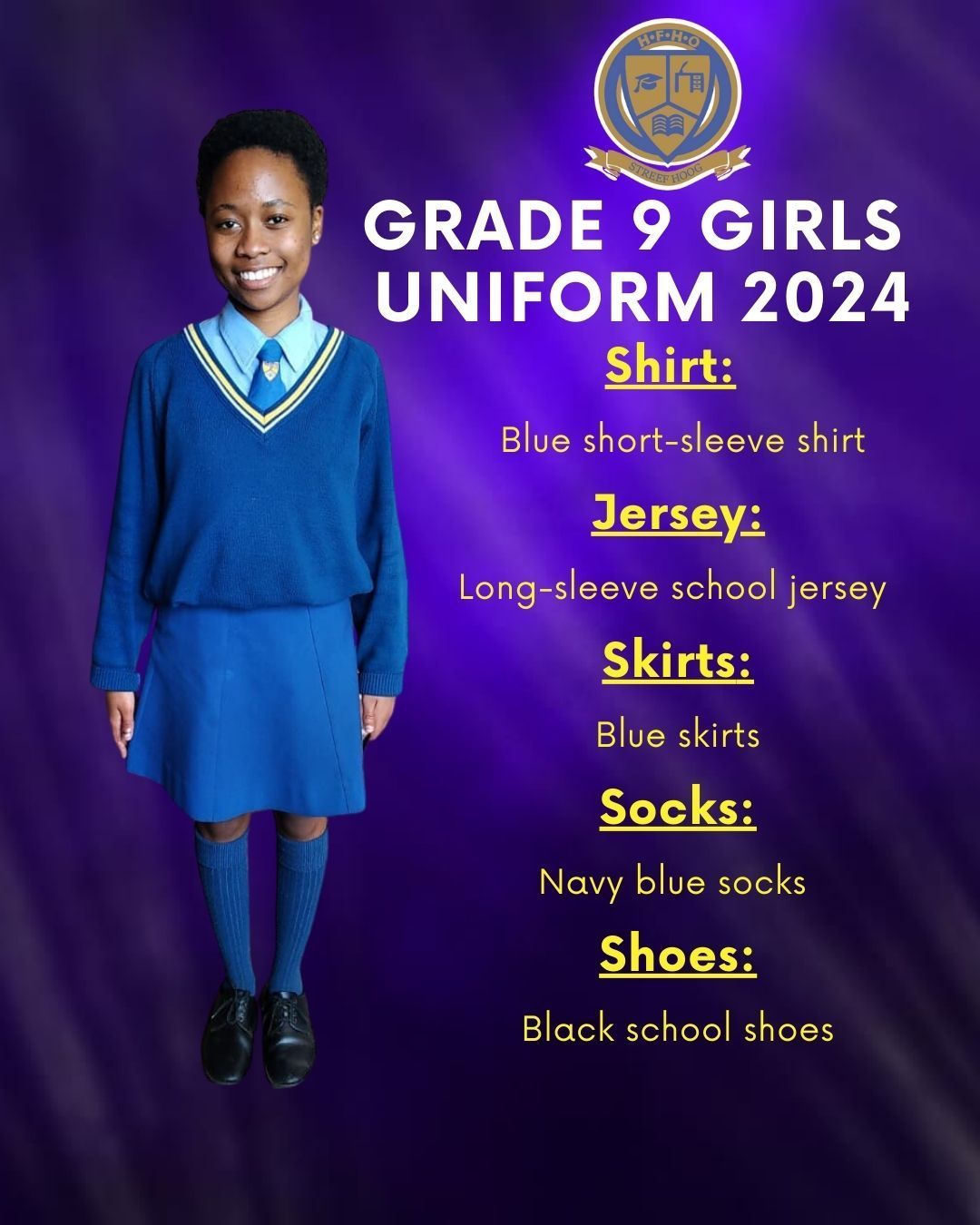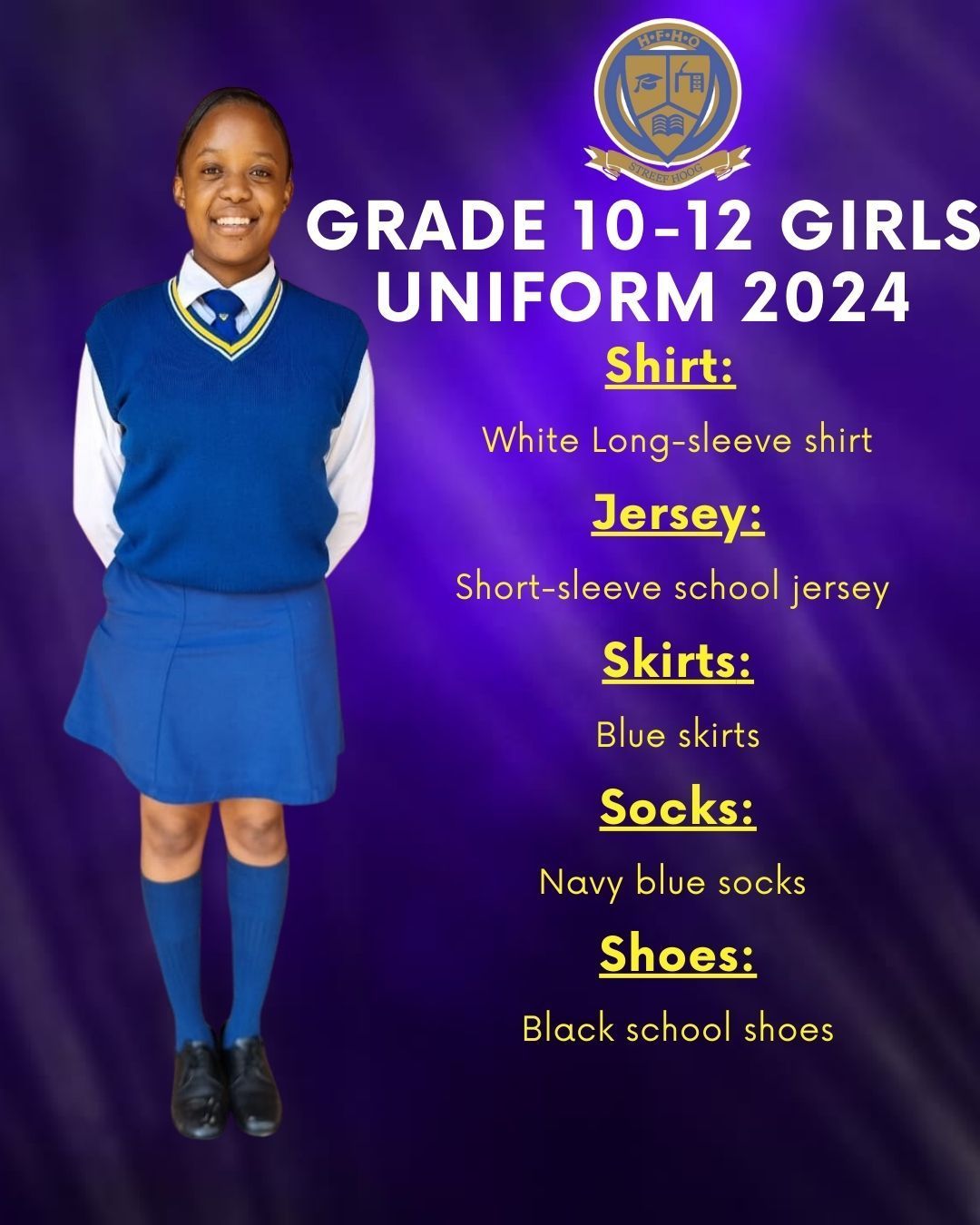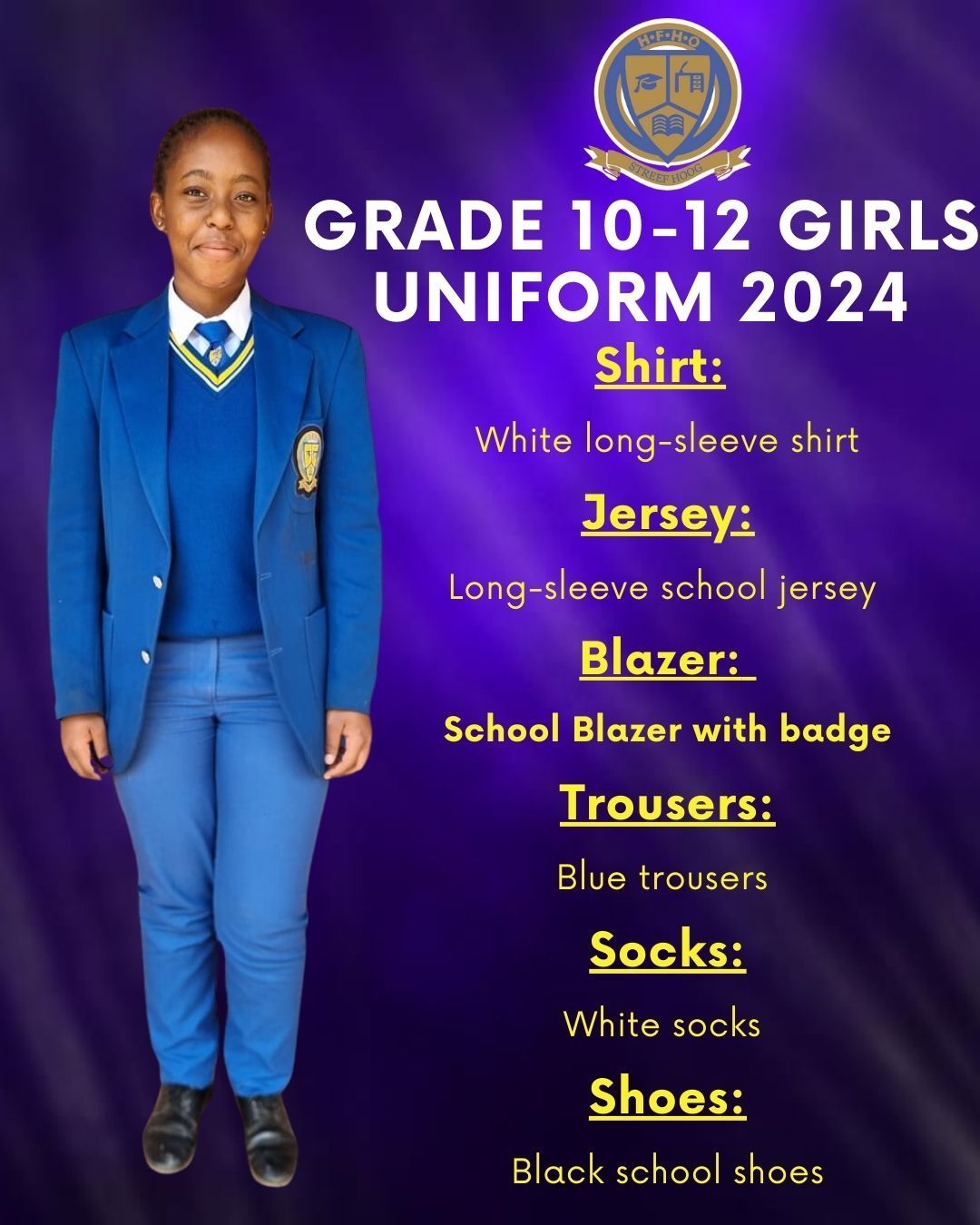SCHOOL RULES / CODE OF CONDUCT
The school rules were set up so that the values and principles reflected in the Code of Conduct can be realized. Thus the purpose behind the school rules is to:
- Create and maintain a positive educational environment
- State clearly what is regarded as acceptable/unacceptable conduct.
- Promote educational and learning objectives.
Written and approved subject - and class policies form part of the school rules.
SCHOOL RULES
INTRODUCTION
The maintenance of order in, and the smooth running of the school, depend on the knowledge that learners and parents have of the school rules. On the next few pages all the school rules are set out, but amendments and additions to these rules may be made when necessary. In such cases, parents will be notified by means of circulars.
Learners of this school have to abide by these rules AT ALL TIMES and parents are urgently requested to ensure that their children do so.
If there is a difference in opinion about the application of a rule, the principal will use his discression and his decision will be final.
DISCIPLINE
1. DISCIPLINARY MEASURES (CORRECTIONAL MEASURES)
DEBIT POINTS
INTRODUCTION
The purpose of our disciplinary measures is not merely to correct unacceptable conduct (namely the disobeying of school rules), or to ensure the maintenance of order and discipline in the school, but rather to guide learners to become responsible and mature decision-makers. For this reason especially, it is important that the disciplinary measures comply with the following minimum criteria:
- Fairness- Reasonableness- Objectivity- Legality- Acknowledging the age, physical - and mental condition of the learner.
The disciplinary process can only be successful if learners, parents and educators co-operate with and support each other.
2. DETENTION PROCEDURES
The school diary contains all the school rules and the disciplinary measures that apply. Learners who disobey these rules will be dealt with according to the stipulated measures. As soon as a learner reaches a balance of -30 debit marks, that learner must attend detention. Learners will be notified a day in advance. NO EXCUSES will be accepted, as learners and parents know what the rules are.
Detentions are held on:
Mondays and Wednesdays - 14:20 to 15:20.
Fridays – 13:30 to 14:30.
Parents are urgently requested not to make other arrangements if their child has to stay for detention, but to adapt their schedule to that of the school. We need and appreciate your mature co-operation and support in this matter, as children have to learn to take responsibility for their actions.
A learner who was absent must - on the day that he/she returns to school - go to the grade head, explain the reason for being absent and ask to change his/her detention date. Failure to do that will result in an additional detention.
A learner’s behavior during detention must be impeccable.
Any disruptive conduct by a learner during a detention session will be punished accordingly and two additional detentions will be awarded.
3. MISCONDUCT
It is the school’s responsibility to lead every learner to adulthood, self-discipline and to become a social responsible citizen.
When a learner fails to do homework repeatedly, the learner will be summoned to attend an internal disciplinary hearing.
If the transgression is of a more serious nature and if a learner is found guilty he/she can be brought before the disciplinary committee of the school’s Governing Body.
If the learner is found guilty by the School Governing Body, it could lead to permanent suspension of such a learner.
3.1 DEMERIT POINTS SYSTEM:
All misdemeanours committed by learners are recorded on the electronic disciplinary system by the teachers, on a daily basis.
Every learner will - upon request - be able to inspect the state of his/her disciplinary record.
The debit - and credit points accumulated by a learner during the course of the year shall be indicated on his/her report on a regular basis.
A detailed print-out of each learner's disciplinary record will be attached to his/her July - and December academic report.
Parents are at any stage welcome to make enquiries at the administrative office / Grade Head, regarding the state of their child's behaviour.
The school sees it as our responsibility to guide every learner towards maturity and self-discipline. All transgressions are classified into four categories, and a detailed misdemeanour list is hereby attached. This list is adjusted from time to time as or when deemed necessary.
3.1.1 CATEGORY 1 TRANSGRESSIONS
Here, debit points are given to learners by teachers, for minor misdemeanours (which however should not and may not be regarded as trifling).
An example of such transgressions would be poor behaviour, inter alia.
Should a learner for example repeatedly behave poorly, debit points are given by the teacher, and the parent is notified about the child's trespass in writing or via SMS.
If, thereafter, the learner still repeatedly behaves poorly, he/she (accompanied by the parents / guardians) will have to appear in front of the grade head. The result could be community service or the application of par. 2.2 above.
3.1.2 CATEGORY 2 TRANSGRESSIONS
Here, debit points are given to learners by teachers, for offences of a less serious nature (which however should not and may not be regarded as inconsequential).
Examples of such transgressions would be fighting (minor scraps) and gambling, inter alia.
The offences could be of such a nature that learners who transgress, would have to appear in front of an internal disciplinary committee chaired by the grade head / deputy principal (Discipline). The result could be community service or the application of par. 2.2 above.
3.1.3 CATEGORY 3 TRANSGRESSIONS
Here, debit points are given to learners by teachers, for offences of a more serious nature.
Examples of such transgressions would be serious fighting, copying during a test/exam, and bunking a school day, inter alia.
The offences could be of such a nature that learners who transgress, would have to appear in front of an internal disciplinary committee chaired by the grade head / deputy principal (Discipline). The result could be community service or the application of par. 2.2 above.
Alternatively, the offence could be of such a serious nature that a learner who transgresses, would have to appear in front of the disciplinary committee of the Governing Body. The result could be permanent suspension/expulsion, should the learner be found guilty by said committee.
3.1.4 CATEGORY 4 TRANSGRESSIONS
Here, debit points are given to learners by teachers, for serious offences.
Examples of such transgressions include theft, being in possession of drugs/alcohol, as well as any violation of the Law.
The offences could be of such a nature that learners who transgress, would have to appear in front of an internal disciplinary committee chaired by the deputy principal (Discipline). The result could be community service or the application of par. 2.2 above.
Alternatively, the offence could be of such a serious nature that a learner who transgresses, would have to appear in front of the disciplinary committee of the Governing Body. The result could be permanent suspension/expulsion, should the learner be found guilty by said committee.
3.1.5 GENERAL
The principal, the deputy principals or the relevant grade heads may as a situation dictates and at his/her/their discretion, allocate community service to learners.
Parents/guardians shall be notified accordingly and in time, telephonically or in writing, in order to make the necessary transport arrangements.
Community service could include the following, inter alia:
Cleaning of class rooms, desks or toilets;Litter removal, gardening or cleaning up the school terrain;Administrative tasks.
A stamp system has been introduced in the school.
Blue stamp:
On a regular basis, learners will receive such a stamp in their work books to indicate that the homework / work in that subject is up to date and done.
Red stamp:
On a regular basis, learners will receive such a stamp to indicate that the homework / work in that subject is not up to date and not done.
Parents need to sign the stamp
and are free to make comments about the situation.
CREDIT SYSTEM
POSITIVE POINTS
3.2.1 MERIT AWARDS:
Credits will be awarded according to performance/positive behaviour. Credits are sent to the office and recorded onto learners’ records. Credit points can cancel out less serious demerit points. The top achievers, who have earned the most points during the year, form the Merit Team and receive merit awards. At the end of each quarter, the names of the top achievers with the best marks are announced. Top achievers can qualify to go on an excursion at the end of the year.
POSITIVE POINTS CAN CANCEL OUT ALL NEGATIVE POINTS
APPEARANCE – GIRLS:
- Skirt: Grade 8 learners grey skirt, Grade 9-12 blue skirts – no tight fit skirts.
- Blouse: Grade 8-9 blue short or long sleeve blouse, Grade 10-12 short-sleeve white blouse. (When you wear the tie, the top button of your blouse must be fastened)
- Trousers: Grade 8 learners grey trousers, Grade 9-12 special blue school trousers – no tight fit trousers.
- Socks: White, short, turn down, alternatively blue bobby socks.
- Shoes: Black, flat heel school shoes with straps or laces.
- Pullover: School pullover.
- Blazer: Blazer with school badge on pocket (COMPULSORY).
- Cap: The school cap may be worn before school, during break and after school.
- Skirt: Special royal blue skirt – no tight fit skirts.
- Blouse: Long-sleeve white blouse.
- Stockings: Blue knee - or long stockings, blue bobby socks.
- Shoes: Black, flat-heel school shoes with straps or laces.
- Jersey: School jersey.
- Blazer: Blazer with school badge on pocket (COMPULSORY).
- Tie: School tie. (When you wear the tie, the top button of your blouse must be fastened)
- Pullover: School pullover.
- Trousers: special blue school trousers– no tight fit trousers.
- Beanie: The school beanie may be worn before school, during break and after school.
- Scarf: The official school scarf may be worn.
SPORT:
- Special sportswear in school colours.
HAIR STYLES:
- Hair may not hang over the eyebrows. Hair at the back may not hang below the collar – it must be cut or tied.
- The hair colour must be natural.
- “Weird” hairstyles are not permitted.
- Hair must be neatly combed and no spikes will be allowed.
- Dreadlocks will be acceptable if it is maintained properly, looks neat and is fastened at the back
- Afros will be allowed on condition that its length overall does not exeed cm., it looks neat and is combed properly.
- The following colours and types of hair decorations are allowed:
- Colours: Royal blue/navy blue, white, and yellow - single colours (not mixed)
- Types: ribbons, combs, banana clips, alice bands, headbands (only royal - or navy blue)
- No pieces of cloth / bandanas are allowed.
- Hair at the back may not be cut in the Chinese bob style.
- Hair may be permed, provided that it looks well-groomed.
- Hair may be cut in layers, but must be neat.
- Hair that is gelled, must be neatly combed and may not be spiky.
- Synthetic extensions and braids are permissible if they:
- Match the natural hair colour;
- Are thin or medium braids only, without any beads or any other decorations;
- Are acrylic braids, NOT wool;
- Are flat against the head;
- Do not look like dreadlocks;
- Are worn according to all the other hair rules as well;
- Can be fastened in one or two ponytails.
NAILS:
Only translucent nail polish may be used. Nails may not protrude beyond the fingertips, when looked at the inside of the fingers.
JEWELLERY:
- No chains or arm bracelets may be worn. (Medic Alert bracelets/pendants are permitted).
- The following earrings are permitted when they are worn in the bottom hole.
- Sleepers
- Semi-permanent sleepers (gold or silver)
- No body-piercing rings, e.g. tongue-/ navel-/ or nose rings, nor nose studs are permitted.
GENERAL - UNIFORM:
- The rules that regulate school uniform and sportswear will be strictly enforced on a daily basis.
- Jerseys may not be stretched and the sleeves may not be rolled or pushed up.
- Length of the skirt must not be more than 15 cm from the ground, measured in a kneeling position.
- Socks must not be rolled down.
- Clothing must be properly marked.
- Only black school shoes may be worn.
- The school blazer is compulsory.
- If long-sleeve shirts are worn, a tie is mandatory. Shirts must be tucked in at all times.
- The general rule is neatness, cleanliness and good personal hygiene.
- No make-up is allowed.
- The official school windbreaker may be worn for sport events only.
- Athletic shorts may not be worn outside the school premises.
- Winter uniform: 2 May to 31 August.
- Any deviation must be discussed with the principal / deputy principal before written permission will be given.
APPEARANCE – BOYS:
- Shirt: grey short-sleeve shirt (When you wear the tie, the top button of your short-sleeve shirt must be fastened)
- Socks: grey school socks
- Shoes: black school shoes
- Trousers: grey trousers or pants– no tight fit trousers or pants.
- Blazer: Blazer with school badge on pocket. (COMPULSARY).
- Cap: The school cap may be worn before school, during break and after school
- Shirt: grey long-sleeve shirt
- Socks: grey school socks
- Shoes: black school shoes
- Trousers: grey trousers (terylene) – no tight fit trousers or pants.
- Tie: school tie (When you wear the tie, the top button of your shirt must be fastened.)
- Pullover: school pullover
- Blazer: Blazer with school badge on pocket. (COMPULSARY).
- Beanie: The school beanie may be worn before school, during break and after school.
- Scarf: The official school scarf may be worn.
SPORT:
- Special sportswear in school colours.
HAIRSTYLES:
- When hair is combed down:
- It may not touch the ears and the fringe may not touch eyebrows;
- It may not touch the shirt collar;
- Spikes on top must not exceed 2,5 cm.
- Gel is permitted (when applied in moderation).
- Side-burns must not be lower than the middle of the ear hole, and must be short.
- The hair colour must be natural at all times.
- Fade hairstyle will be allowed on condition that it looks neat and it is combed at all times. A “fade” hairstyle that make a pattern is unacceptable.
- Hair must be worn in a natural style. No other styles will be tolerated e.g. punk / mohawk/ lightning stripes.
- No steps or patterns will be allowed.
- If applicable, boys must shave every day. If the beard/moustache is visible, the learner must shave. Learners who refuse to obey, will be sent home to shave. As an alternative, there will be razor-blades for sale at the office (R10.00 each).
- No moustaches or beards are allowed.
- Hair may not be worn in braid nor in dreadlock style.
JEWELLERY:
- No chains or bracelets may be worn (Medical Alert bracelet/pendant is allowed).
- No body-piercing rings whatsoever (tongue -/nose -/ navel -) are allowed.
GENERAL - UNIFORM:
- The rules that regulate school uniform and sportswear will be strictly enforced on a daily basis.
- Only the official uniform may be worn to school and to sports meetings.
- Clothes must be properly marked.
- Jerseys may not be stretched. Sleeves of jerseys must reach the wrist.
- Shirt sleeves may be rolled up, but must be above the elbow.
- Shirts must always be tucked into the trousers. No other shirts or vests must be visible at the neck, nor may protrude under the shirt.
- If long-sleeve shirts are worn, a tie is mandatory. Shirts must be tucked in at all times.
- Only black and brown belts (with plain small buckles) that fit through the loops on the trouser is permissable
- The length of the trouser leg must reach the shoelace knot.
- Only black school shoes may be worn.
- The school blazer is compulsory.
- The general rule is neatness, cleanliness and good personal hygiene.
- The official school windbreaker may be worn for sport events only.
- Winter uniform: 2 May to 31 August.
Any deviation must be discussed with the principal / deputy principal before written permission will be given.
ASSEMBLY, CHANGING CLASSES AND ENDING THE SCHOOL DAY:
- The school starts at 07:25 and all gates will close at 07:25. Learners who arrive late for school and whose parents / guardians did not make arrangements with the office, will assemble at a separate assembly point for late comers. Such learners will be granted permission to enter the school upon receiving a permission slip and the necessary demerit points. Upon entering the classroom, the permission slip needs to be handed to the subject educator (where the learner is at that time) and who will allow him/her to continue with the normal school day.
- All learners must go directly to their classes when the bell rings at 07:25 - the start of period 1.
- If there is assembly, all learners must line up in the hall or in the Den at 07:25.
- Rows must be formed with suitcases on the right-hand side of learners.
- This must all happen in silence; otherwise too much time is wasted in chaos.
- Before the assembly, suitcases must be placed in the correct row in the quad.
- Changing classes will be orderly, and the shortest possible route to the next class must be taken. It is possible to walk between the furthest classes in 3 minutes’ time.
- No lingering along the way.
- Changing classes should take place across the quad, i.e. on the concrete slab, whilst the bottom corridor along the passage of the main building must be kept clear as far as possible.
- No learners will be allowed to go to the toilets during lesson hours or tuition time.
- Boys may not pass directly in front of the girls’ ablution facilities and vice versa.
- No learner may be outside a classroom or class group during lesson time without the prescribed permission card.
- At the conclusion of the day, silence will be asked over the intercom and announcements made. Then the bell will dismiss the learners.
- No learner may leave before the bell rings.
SCHOOL FUNCTIONS:
The same rules regarding behaviour and dress uniform are binding when learners attend any school functions or sports meetings, or act as representatives of the school elsewhere.
ABSENCE:
- A parent/guardian’s letter explaining any absence from school needs to be handed to the class teacher and accompanied by a doctor’s certificate of a registered medical practitioner where applicable, on the day of return. (See Code of Conduct: Undertaking, par. 2.1.3 )
- If a learner is unable to write an exam paper, a term test, a class test or do a portfolio assignment due to absence, a doctor’s certificate of a registered medical practitioner is also required.
- Truancy, or bunking during lesson hours, will be punished with detention and can lead to suspension.
- A doctor’s certificate from a registered medical practitioner must be handed in for absences exceeding 3 days.
- Arrangements must be made with all the subject educators to catch up with missed work/tests within 2 days.
- Note: A phone call does not replace the letter of absence from a parent.
- The school must have written proof from the legitimate parent / guardian that the parent / guardian is aware of the child’s absence.
- If a learner was absent for a total of more than 10 days in total, he or she must re-register (see par 2.1.3).
PERMISSION TO LEAVE THE SCHOOL TERRAIN:
- Permission to leave the school premises during school hours will only be granted if the legal parent / guardian enters the request in the school diary.
- The learner is granted permission only during the first period by the specific grade head.
- Every grade has a register/book in which any permission granted for the day, is written.
- After the first period, the book is returned to the administrative office where the legal parent / guardian must sign before collecting a learner. NO LEARNER WILL BE ALLOWED TO LEAVE THE SCHOOL PREMISES ON HIS / HER OWN.
- In serious and exceptional cases permission can be requested telephonically from the principal / deputy principal, but not by learners themselves.
- All special permission will be entered into a book and in such cases the legal PARENT / GUARDIAN will still sign before taking the learner.
- Appointments for learner’s licenses and driver’s licenses must be made during holidays.
- No learner may phone his parent/guardian to come and fetch him/her during school hours.
NB: LEARNERS MAY ONLY LEAVE SCHOOL ACCOMPANIED BY THEIR LEGAL PARENTS / GUARDIAN.
PROHIBITED AREAS DURING BREAK (before school / after school):
- Caretaker’s house.
- The whole area south of the main building.
- The structure at the cricket pitch.
- The embankments and clubhouse area.
- Clubhouse.
- Passages and classrooms, except when accompanied by a teacher.
- Workers’ houses.
- Vehicles.
- Tennis clubhouse and tennis courts.
- Netball clubhouse and netball courts.
- Zinc shed (tractor - and bus garage); behind or close to it.
- High jump mats, scrumming machines, A-frames and other apparatus which are school property.
- The hall and area west of the hall, including hockey fields..
- The area and vicinity of the staff room.
- The area between the hall and the main entrance.
- Between the two pavilions, and the northern (furthest) part of the pavilion.
BANNED ARTICLES AT SCHOOL:
- Sound equipment and other valuable articles.
- Dangerous objects such as fire arms, ammunition, fireworks/crackers, knives, ninja stars, catapults, screwdrivers, horsewhips, shock devices and any object that can cause bodily harm.
- Liquor (any form of), drugs, pornography, matches, cigarettes, hubbly pipes, stink bombs, etc.
- Pets.
- Gambling or playing gambling games of any kind.
- Electronic games.
- In possession of dice / cards / any other gambling items.
SCHOOL GROUNDS:
- Rubble and paper may not be strewn. Neatness shows self-respect and pride.
- Learners will be held responsible for any damage caused to school property.
- Use water and electricity sparingly.
- No learner is permitted to throw stones or any other objects.
- If the school gates are locked after normal school hours, it means that the school grounds may not be entered. Take note of notices at the gate that read as follows “RIGHT OF ADMISSION RESERVED”
- Trees and shrubs may not be damaged.
CLASS ROOMS:
- No eating and drinking in class rooms.
- Snack wrappers and –containers must be put in school suitcases or thrown into rubbish bins when entering class rooms.
ABLUTION FACILITIES:
- Please keep these facilities clean and tidy.
- No games may be played inside the toilets.
- No eating.
- No smoking – the school is a smoke-free zone.
- No graffiti against walls and doors or kicking whatsoever.
- Use paper and water sparingly.
TOILETS
- The toilets must only be used before school, during break or after school.
- Toilets are locked during class time and may only be used when it is really urgent and when special permission has been obtained from the teacher.
- Keys may be obtained from the delegated educators on producing your diary and the teacher’s permission card.
- Only ONE learner at a time may get permission to go to the toilets.
- Only ONE learner at a time may be behind the closed door of a cubicle.
- NO boy is allowed in the girls’ toilets and NO girl is allowed in the boys’ toilets.
BEHAVIOUR:
- Be well-mannered and polite towards friends, visitors and teachers.
- Greet teachers and visitors to the school.
- Assault of a teacher is a schedule 2 offence according to the South African School's Act and will lead to immediate suspension.
- Be helpful and let visitors feel welcome.
- Behave in such a way that your own name and your school’s name will be carried with pride.
DETENTION CLASSES:
- Mondays and Wednesdays - 14:20 to 15:20.
- Fridays – 13:30 to 14:30.
CELL PHONES:
- A learner must switch off his/her cellphone immediately upon entering the school grounds. It may be switched on again only when the learner has left the school grounds.
- Cellphone and cellphone equipment may not even be visible during the school day. They must be put away and out of sight.
- Learners may not call their parents to come and fetch them when they are ill.
- A cellphone is not a calculator and may not be used as such.
- If a cell phone is confiscated by an educator, it will be handed in at the Finance Office and the fine to buy the phone back will be R50.00.
USING THE SCHOOL HALL:
- Learners have specific line-up positions and seating areas.
- Learners line up according to their register classes and enter without talking, in single file.
- Learners leave their school cases and bags in the allocated areas.
- No eating or drinking in hall.
VANDALISM:
- Learners may not write graffiti / scratch on desks, chairs, walls, etc.
- No item belonging to the school or any other person may be broken or damaged.
- Textbooks, diaries, etc. must be covered and maintained in the best condition possible.
USING THE SICK BAY:
- NO medicine is available at the school.
- If a learner is ill and can't attend school, the office, (via the Grade-head) will phone the parents / guardian of such a learner to fetch the child immediately.
- A learner who’s parents / guardians cant fetch him and needs to go to the sick bay must:
- Report to the office (with permission of the class teacher);
- Obtains permission by the Grade head and the administrative staff member responsible;
- Leaves the school case / other bags in the office of the Grade head;
- Keeps the sick bay clean and tidy.
- A learner may not visit another learner in the sick bay – not for any reason.
- A learner in the sick bay stays there and does not go out for break.
- No learner will be permitted to leave the sick bay unless authorized by the Grade-head.
- No food is allowed in the sick bay.
SCHOOL CASES/SPORTS BAGS:
- A proper, strong, sturdy school case is compulsory, with partitions and reinforced sides, so that school books will not be damaged. No hard plastic suitcases will be permitted.
- Only the owner’s name and class may be written on the outside.
- No drawings, names, slogans, etc. may appear on the outside of the school case or on any other bag used for school purposes.
- A learner’s school case or any other bag must be in his/her possession at all times.
- Suitcases need to be taken with learners during break. Your property is your responsibility.
- School cases/bags must have the owner’s name clearly indicated on the outside.
- Money or other valuable items may be handed in at the office for safekeeping. If you keep these in your schoolbag, they remain your responsibility, not the school’s.
- School cases/bags are left in the allocated area where two RCL members will look after them during assembly.
- All cases/bags are taken with the learners to the place where they practice sport.
- Coaches will indicate an area for the bags and will make arrangements for safekeeping wherever possible. If not, the bag remains the responsibility of the learner.
GENERAL:
- The school starts at 07:25 and all gates will close at 07:25. Learners who arrive late for school and whose parents / guardians did not make arrangements with the office, will assemble at a separate assembly point for late comers. Such learners will be granted permission to enter the school upon receiving a permission slip and the necessary demerit points. Upon entering the classroom, the permission slip needs to be handed to the subject educator (where the learner is at that time) and who will allow him/her to continue with the normal school day.
- All learners must go directly to their classes when the bell rings at 07:25 - the start of period 1.
- If there is assembly, all learners must line up in the hall or in the quadrangle at 07:25.
- Learners who drive cars / motorcycles to school, must have a valid driver’s license and must obtain permission from top management at the office. Misuse can lead to the suspension of this right.
- Bicycles and motor cycles must be parked in the designated area only.
- No telephone calls may be made during school hours. In exceptional cases, the principal / deputy principal can give permission.
- No smoking is allowed on the grounds, in the school building or at any other place where learners wear their uniform. According to legislation the school is a smoke-free zone. The smoking fine is R100.
- The use of any substance containing liquor and other drugs by learners at school or during sports- and other functions (also at other schools) will lead to suspension.
- When teachers are absent, the substitute time-table must be strictly followed. The learner representative member acts as leader. Nobody may sit on the pavilion during these periods. Learners must be in a classroom under a teacher’s supervision.
- Boys and girls may not hold hands or cling to one another on the school grounds, in the street or when dressed in school uniform.
- Chewing gum is prohibited on the school premises.
- TATTOO MARKS ARE PROHIBITED.
- Learners are allowed to talk only Afrikaans or English whilst at school.
- Student Council members and L.R.C. members must be respected.
- Learners traveling by bus must obey the bus rules. It’s a transgression to harm the school’s name through your conduct.
- Baviaanspoort Road may only be crossed at the pedestrian crossing.
- The traffic/metro-police must be obeyed at all times.
- Learners are responsible for any damage caused by them. This includes the replacement of window panes, text books, etc. as well as the repair of furniture that have been written or scratched on.
- The school diary and timetable must be on hand daily and must be in the possession of the rightful owner.
- It is a serious offence to play with or to interfere with the fire extinguishers.
- No learner may operate the photocopiers or enter any office without permission.
- The entrance hall/foyer may not be used as a thorough fare before or after school.
- No learner will be allowed in or near the staff room



